This is the transcript for a podcast! If you'd like to listen to it, please subscribe on iTunes. Let me know what you think in the comments or on Twitter.
This week on the Myths and Legends podcast, it’s the story of Mulan. You’ll see how looking at historical context can ruin the message of even the most inspirational of tales, and that even if your name brings to mind 80s spandex, you can lead a rebellion and hold an empire hostage. In the creature of the week, if you’ve ever felt like you’re being watched in the forest, the good news is that it’s just an adorable Irish wolfhound that’s really good at sucking in his stomach. The bad news is that, unless you’re stinking drunk, he’s probably going to eat you.
This is the Myths and Legends podcast, episode 4A: A Likely Hero
Mulan: A Likely Hero
This is a podcast where I tell the original tales behind legendary stories. Some are popular stories you think you know, but with surprising origins. Others are stories you probably haven’t heard, but really should.
This week is a shorter story, with one episode on Mulan, the Chinese legendary hero that Disney made kind of a big movie out of in the nineties.
Background
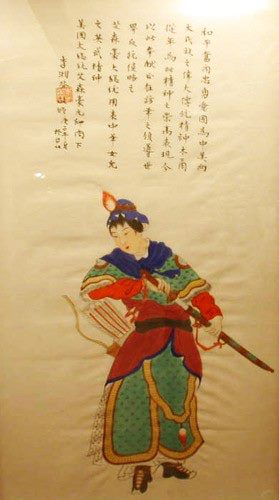 This story takes place in China in the fifth or sixth century, essentially a couple hundred years before the Volsungs of the last story, and almost exactly the same time as King Arthur and his knights are galloping around England.
This story takes place in China in the fifth or sixth century, essentially a couple hundred years before the Volsungs of the last story, and almost exactly the same time as King Arthur and his knights are galloping around England.
Now for this, there are multiple sources. The first source is a poem called the Ballad of Mulan, but that is only 360ish words long and only tells the most basic of the stories. It was written in about the 12th century, though it is said to be referencing a much older work that’s been lost to history. There’s a stage play that was written in the 16th century, or the beginning of the early modern period, that elaborates on the story. After that, there’s a 17th century romance that touches on the story, though we will just use bits and pieces from that. Most of the stories thereafter are just expanded versions of the originals, so I’m just going to use those three sources.
Anyway, it takes place in China in the mid-fifth century, and it’s at a time when there is great unrest in the empire. This is a time when revolts were breaking out all over the place, and they would sometimes take decades to pacify.
The Khan, basically the emperor, is drafting an army. There’s a usurper, a bandit leader, who has put together a large militia and is attempting to overthrow the Khan. He’s from the Black Mountain, and he’s called, no joke, Leopard Skin. I don’t speak Chinese, so there will be mispronunciations in this, but if anyone does, please let me know if Leopard Skin is remotely intimidating. It just makes me think of some bandit leader in leopard print spandex dance fighting around his cave. Oh also, there will be dance fighting later.
Ok, so Leopard Skin has raised an army of over 100,000 men, one that represents an existential threat to the empire. The khan needs as many men as he can get. He sends out draft orders to all the villages.
Preparations
It comes to the village of Hua Mulan’s father, Hua Hu. Note that Hua is the family name, and Mulan and Hu are the first names of Mulan and her father, respectively. Twelve have been posted, and they all demand that a member of the Hua family report for duty as soon as possible.
Hua Hu has three children, an oldest daughter, named Munan which I can’t imagine that ever got confusing, having Munan and Mulan in the same household. Mulan was the middle child, and he did have a son, but the boy was still an infant. The father was so wracked with anxiety that he was considering taking his own life, presumably to avoid dishonor, but that’s not super clear.
Now, the Mulan from the Disney story is, let’s be frank, clumsy with little to no self-confidence. She doesn’t know who she is or what she wants, and while she does make the courageous and honorable choice to take her father’s place, she is a bumbling fool at the camp, and it takes her a long time before she is anything resembling a competent soldier.
I came to pour tea and kick butt, and I'm all out of tea
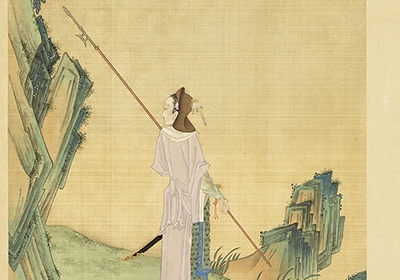
And you know who was right by his side? Mulan. She trained daily with him, first out of curiosity and to stem the boredom inherent in medieval village life, but then she found that she really had a talent for these things. She would spar with her father, and go off with him on hunts. She would help him maintain his armor, and he would tell her all about his life in the army.
She’s not a tomboy, though, or a fish out of water. She weaves at the loom as confidently as she can thrust a spear, wears silk and armor with the same amount of comfort, and will put you on the ground in hand-to-hand combat and then make you some tea. I don’t really swear in this podcast, but legendary Mulan is an all-around badass. She wouldn’t wonder when her reflection will show who she is inside, because she is supremely confident in who she is and what she needs to do.
As she is walking up to her house, she sees him, struggling to get up after leaning on a fencepost. He knits his eyebrows at the sound of clashing swords in the distance, people sparring, preparing. His joy is not in winning victories or gaining renown, but watching his daughters comb their hair. He sees death in those conscription papers, and is greatly saddened that he will not be able to live to see his daughters get married.
Mulan to her credit, doesn’t hesitate. She has her father’s knowledge and she, at the age of 17, can put it to use. She sees a servant out by the hedge, and enlists her to help.
They go to the market, and she gives the servant money. They buy a horse, bow, arrows, a sword, a spear, and men’s armor. They stuff it into a pack, tie it to the horse, and stow it at a neighbor’s house who apparently won’t ask questions.
That night, she looks at her feet. She needs them to be large and sturdy, so she must unbind them.
Footbinding is gross
If you haven’t ever heard of footbinding, you’re lucky, and I’m sorry, because I’m about to go into it.
It’s, frankly, horrifying. Starting in the 10th or 11th century, most upperclass women in imperial china had this done to their feet. It would make them small, like really, really small. Like half the size of normal feet. The process is barbaric. Basically it would start when a young girl was between four and seven years old, before the arch had a chance to develop completely, and it would take place in the winter where the foot might have a chance of being numb.
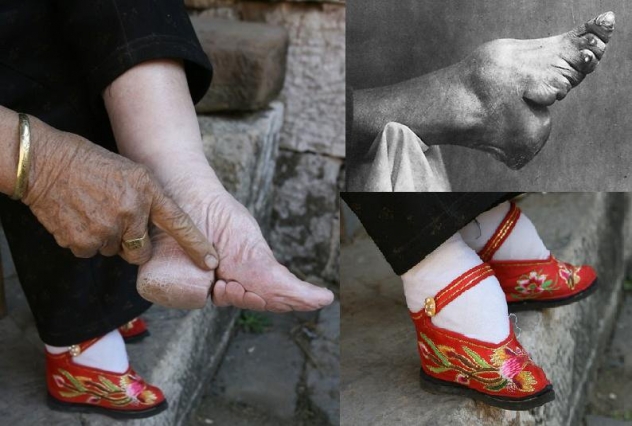 The foot was soaked and the nails cut back, and then, brace yourself, all toes but the big toe were curled under the foot, and great pressure was applied until the toes broke. It gets worse, the toes were held tightly and then they made the girl straighten her ankle, and they forcibly broke the arch of the foot, shortening it severely. They then would bandage the toes to the bottom of the foot, and then wrap the whole foot up so that it is severely shortened and it folds at the arch, pulling the ball of the foot and the heel as close together as possible. It is then wrapped in cloth and sewed up so that the girls can’t loosen it.
The foot was soaked and the nails cut back, and then, brace yourself, all toes but the big toe were curled under the foot, and great pressure was applied until the toes broke. It gets worse, the toes were held tightly and then they made the girl straighten her ankle, and they forcibly broke the arch of the foot, shortening it severely. They then would bandage the toes to the bottom of the foot, and then wrap the whole foot up so that it is severely shortened and it folds at the arch, pulling the ball of the foot and the heel as close together as possible. It is then wrapped in cloth and sewed up so that the girls can’t loosen it.
Over the course of the next few years they would have to be unbound on a regular basis and cleaned and…uh…softened up if they were resistant. There were professional feet binders who did this, since the mothers might be sympathetic to their daughter’s pain and might not make it as tight as they need to. Eventually the deformities would become permanent, though not without a whole host of health problems, like the bones of the foot re-breaking, infection, or sepsis. Let alone the extreme difficulty the woman would have just walking around. That is thought to be one of the appeals – the attractiveness of the gait, as well as the tiny feet in general. Yeesh.
For a woman like Mulan, these feet would be seen as a mark of high society and a way for her to “marry up,” so to speak.
Also, if you’ve been paying attention to the dates, the inclusion of foot-binding in this story is an anachronism, since foot binding was not in practice yet during the time the story takes place. It was, however, in widespread practice during the time the play was put down to paper.
Mulan looks at her feet, unbound, and painfully moves her toes back. She’s a little distressed that years of painful and horrific footbinding will go to waste, but she comforts herself. Her family apparently has a secret herb that she just needs to boil and soak her feet in, and they will return to their tiny shape. Smaller actually, and in no time at all. Why she didn’t just do this instead of years of pain is beyond me.
Gonna need a montage
She changes shoes, and painfully gets used to her much more normal feet. She sneaks out to her horse.
She was a little concerned – it had been a while since she trained with her father, though it is all coming back to her. She runs through some exercises with everything, and somehow mounts the horse without hands, though I can’t seem to find a way in which this is possible. Sitting atop the horse, armored to the hilt she felt like she could bring down not only Leopard Skin, but the black mountain itself.
Off to war
The next day her family comes to breakfast and she’s sitting there, hair pinned up in a male fashion, in men’s armor. She tells them to sit.
She said that today is the day her father needs to leave. Is he going to enlist? Her mother jumps up and says he’s too old. Seriously? Why would you ask that? Can’t you see how upsetting it is? Mulan then calmly asks if her brother and sister can go. The mother says, no, the sister can’t, and the brother’s an infant. What are you driving a…..ohhhh.
Mulan told her family to look at her. They saw a confident, powerful person sitting in front of them at the table. She asked, almost rhetorically, if she was fit to go. Her mother nodded.
In tears, she said it was obvious Mulan was fit to go, but what would happen to her? Has she thought this through? She would be thousands of miles away and surrounded by men. They’ll have to eat, sleep, shower, and go to the bathroom together. This will last, what, a few days before she’s found out and disgraces herself. She’ll be surrounded by men for years on end. Desperate men. Lonely men. What if she can’t…control herself. Or, worse, what if her comrades in arms can’t control themselves? That’s, of course, horrible, but it’s implied to be more horrible because then Mulan wouldn’t be suitable for marriage to a good family. As an aside, she has a real and valid concern, but for exactly the wrong reason.
Mulan tells her mother not to worry, and the woman stops talking. Confidence radiates from Mulan’s voice. She has listened to her father’s stories for years – she will make it work. Mulan’s mother, though, is not exactly worried about that, though. She then breaks down in tears, realizing that she needs to leave her family. This is war, and in the best case scenario it will be years until she comes back. Worst case, they will never see her again. The family holds each other and weeps.
Goodbyes
There is a knock at the door. The soldiers have come for Hua Hu. They ask for the man named Hu, and Mulan steps up. The enlisting officer has demanded he come, and Mulan just needs a few moments to get everything together. She says a tearful goodbye to her family and leaves with the soldiers.
Creeper company
She’s riding with two officers, and the second one remarks that this Hu fellow is handsome. Like, wow, really handsome. He says, and I quote, “he doesn’t look like an officer, but a feast for the eye.” They ride off in the direction of the enlisting officer.
They check in with the enlisting officer. He takes one look at Mulan, says something to the effect of, huh…I thought Hua Hu was a lot older than that, and waves her on. She enters at the rank her father left, as an officer, and rides along with the two soldiers from the nearby village. They break camp, and ride for the Black Mountain.
The days turn into weeks on road, and snowflakes begin to fall on her armor. She has already stitched them up with the needle and leather bindings her mother gave her. She brushes them with her hands, and begins to cry. Immediately, she brings her hands to her eyes to brush the tears off and protect her makeup, but remembers that she doesn’t need to.
They gallop over frozen mountains and through passes until they see the walled city at the foot of the Black Mountain. The city is flying the wannabe usurper’s flags, but camped outside are the emperor’s armies.
Leopard Skin
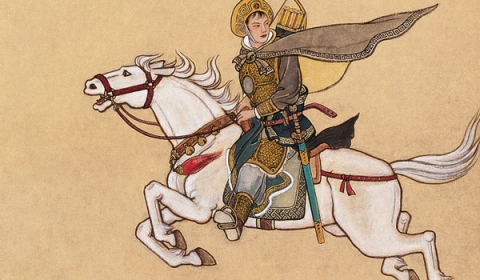 They dismount their horses and walk through line after line of tents. Mulan begins to sweat a bit. On the trip here, she had found a way to hide her gender, by going to the bathroom privately or slipping off when it was time to bathe. She would make it work, though. She had to.
They dismount their horses and walk through line after line of tents. Mulan begins to sweat a bit. On the trip here, she had found a way to hide her gender, by going to the bathroom privately or slipping off when it was time to bathe. She would make it work, though. She had to.
And make it work she did. If there was going to be a Donny Osmund sung musical number, this would be it, because Mulan and the three-thousand other new recruits were put through training by general Ping, and Mulan rose to the top. The army would be divided into three divisions for the final attack on the valley in which Leopard skin was hiding.
And yes, I said final attack. As it turns out, Mulan showed up at the tail end of the war. Communication over a vast, rural empire is especially difficult in the middle ages, and so Leopard Skin was all but beaten. He had holed up in some valley, but they found him, and were wheeling siege engines to his position in order to force him into a battle. He and whatever troops he had left would be forced out to meet Mulan’s army.
I understand that General Ping saw promise in Mulan, but putting her at the command of the army that will meet the desperate, cornered men head on doesn’t exactly sound like a great mission. They have to know if they are captured they will be executed, so they will fight to the death. While they can be assured of victory, Ping is giving this particular assignment to a new recruit. Sure, Mulan shows promise, but Ping would rather this nobody from the provinces take whatever danger is left.
Mulan is nervous, but accepts. They ride out to battle the next day.
The Battle
Sadly, here is where the stories get sparse. The poem is 360 lines, so there isn’t much mentioned there, and the stage play has directions for the actors, but not much description. It’s understood that there would have been elaborate fight scenes. I’ll try to fill it out as best I can.
Mulan rides out on her horse, leading her troops. Cannons are going off behind her, and the rebels start pouring out of their hiding spots in the mountain. They swarm out like insects, and the Chinese line and rebel line smash into each other.
Mulan is slicing down with her spear when she spots him. There, in the back, is Leopard Skin. He is determined at first, but he can see the tens of thousands of men (and one woman) in the Chinese army, their cannons, and the men closing in from the sides. He spurs his horse back to the hideout.
Without their leader, the rebel army falls into bedlam. The line breaks, and Mulan gives chase, presumably dodging trees and other debris falling as a result of the Chinese cannons. She sees his horse outside what’s left of the hideout. She dismounts, draws her sword, and enters.
Capture
It’s dark inside, and he almost hits her with his first swipe, but she dodges it. She can see a hole dug in toward the back of the room with a pack prepared nearby. He was going to scurry away like a rat if she hadn’t gotten here.
They fight, and she can hear her father’s gentle instructions as she deftly parries sword thrusts and swipes, backing him into the corner of the room. His back touches the wall, and he turns his head in surprise. This is the opportunity she needs. She slices his hand, and he drops his sword. He glances down, then up to see Mulan’s sword at his neck. She smirks.
Of course, none of this is in the original versions. In the poem, it’s just said that she captures him, and in the play it’s said that there is a lengthy one-on-one battle, where there would presumably be a choreographed fight scene. So here's where I'm imagining the leopard skin dance battle. And that's a phrase I never thought I would say on this podcast.
She walks out with Leopard Skin at sword point to the adulation of the men as they are subduing the rebel forces. She is congratulated in front of the men by General Ping, and she is given command over a large amount of men.
They occupy the rebel stronghold for months, and from there they branch out and quell the rebellions in the land, Mulan showing great intelligence in her commands. Finally, after a while, it is time to take the traitors to the capitol.
She rides into the capitol to a celebration of the victory over the rebels, and is summoned to a meeting with the Emperor himself. There, she stands next to Ping, who gives her the majority of the credit for the capture of Leopard Skin. The emperor nods, and bestows honors on them.
Adulations and Endings
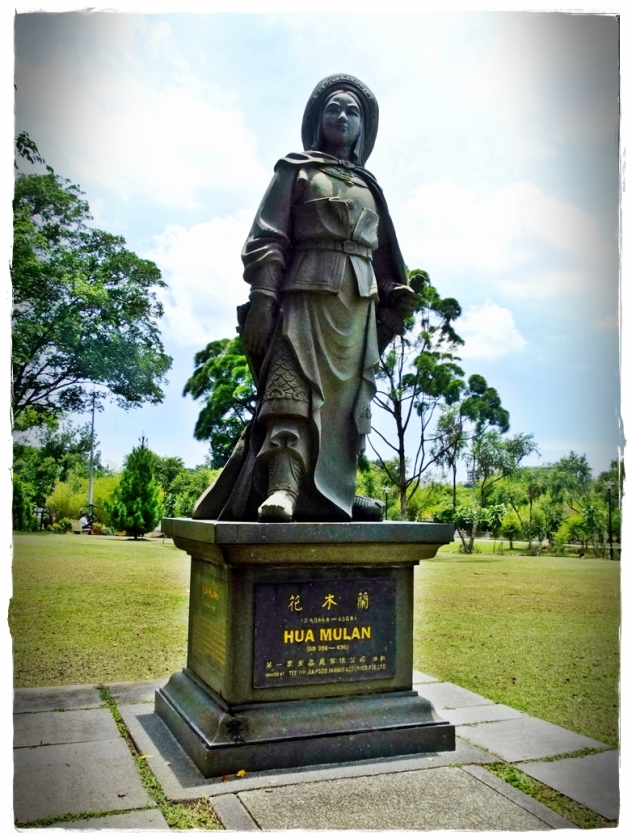 Ping will be the Marquis, basically a nobleman who governs an area, and Mulan is given the title of attendant in the Emperor’s court, a high honor. She’s given three month’s leave to go visit her family, and upon her return she will take the official hat and girdle. She refuses, though. To the court's surprise, all she wants is to go home to be with her family. The emperor allows her to go – after all, this guy is a hero, and can have whatever he wants. The emperor shrugs and announces other awards and honors, and then decrees Leopard Skin is to be executed for his treason.
Ping will be the Marquis, basically a nobleman who governs an area, and Mulan is given the title of attendant in the Emperor’s court, a high honor. She’s given three month’s leave to go visit her family, and upon her return she will take the official hat and girdle. She refuses, though. To the court's surprise, all she wants is to go home to be with her family. The emperor allows her to go – after all, this guy is a hero, and can have whatever he wants. The emperor shrugs and announces other awards and honors, and then decrees Leopard Skin is to be executed for his treason.
She says goodbye to Ping, and makes for the city gates when she runs into the soldiers from the village nearby her – the ones she had left with, now years ago. They were given the honor of commanding hundreds of men each, but now also have time off, and they want to travel with Mulan. The three leave the city together.
On the way back, one of them remarks that Hua Hu, Mulan, is so weird because she won’t ever let them watch her go to the bathroom. If you’ve ever hung out with your guy friends and they won’t let you watch them go to the bathroom, then they are the weird ones.
The other soldiers smacks him. He says Hua Hu does that because he was born a nobleman. He just has too much class. Also, no, you can’t watch me go to the bathroom. Stop asking that.
Mulan returns from her super-weird private bathroom break and must have overheard them, because she says that in the temple next to her home there is a clay statue, in the image of a male, but that suddenly changes his looks into a beautiful lady. They say that absolutely not true, and she says they should come home with her and see.
Revelations
They return home, and she invites the soldiers in for lunch. They sit and visit with her family, and she changes out of her armor and meets with her family in private. They embrace, and she learns that her sister is married and her brother is now in his early teen years. She tells them of what happened. Her mom laments how she must have suffered, but she says she is as gold that passes throught the fire, or a lotus that emerges from the mud without blemish. She walks out, to reveal herself to the soldiers.
And...they are totally cool with it. They just remark that they marched with her, slept next to her, and spent day in and day out with her for twelve years, and they never suspected anything. Though this does help soldier number two understand the confusing feelings he has had for his commanding officer for the last decade.
12 years?!
And this is where I should also address that Mulan apparently spent twelve years in the army. I honestly have no idea how this is possible, as it seemed like the trip to Leopard Skin, ending the rebellion, on to the capitol, and then home should have taken no more than two years. There's really no accounting for twelve, since Leopard Skin was kept alive until he went to the capitol, so it not like they would just bring him along unnecessarily as they campaign around the country. Though, upon thinking about it, perhaps Leopard Skin was a leader of a much larger revolt, one that took years of campaigning around the countryside, defeating an dispersing his men and using him as an example. Unfortunately, there isn’t a historical Leopard Skin to look at, so the twelve years will just have to be conjecture.
Anyway, she says she didn't tell them not because there was some possibility of her being shamed or put to death for being a woman. No, she didn't tell them because...for all those years, they were like, and I quote, “dry wood, next to a fierce fire.” I'll trust you to read between the lines on this one. But yeah, it was not a big deal at all that she was a woman the whole time, and though her femininity was hard to hide (see soldier two's constant comments and attraction) no one ever gave it a second thought. She was such a badass that it was ridiculous for anyone in the army to consider that she could not be a man. And even if it did matter, she singlehandedly saved the country, so even if there was some death penalty or huge shame, which there wasn't, she would probably get a pass.Then the soldiers leave. They want to allow Mulan to catch up with her family, and so they take off, assuring her, after twelve years being kind of brothers-in-arms, that they will catch up with her soon.
Because she just has to get married
As soon as they exit, another young man arrives, about Mulan's age. Mulan's mother brings him in, asking if he needs anything. She tells Mulan that this is her fiancée and, well, since he is here, why not get married now? Mulan turns away in shyness, but remarks on how weird it is that the soldier that took down a rebel leader should be nervous around her future husband. It's known that he's an important guy, and he is well regarded in the emperor's court, as he just passed his exams and will be an official in charge of book editing.
The story ends just before the wedding, with Mulan saying that she will marry the man, and she will follow him on his career. Even though she just came home from the war, she will not bring weapons with her into her bedroom...so to speak.
In some tellings, she had actually accepted the position in the emperor's court. In this case, it's understood that she will give up her position in the emperor's court and be his wife. She muses, as the play closes out, how she had spent seventeen years as a woman, and twelve years as a man. People have looked at her over and over, but it is obvious the distinction between male and female isn't told by the eyes alone. Maybe that difference isn't that apparent. Maybe it isn't that important.
Thoughts
So yeah, that's the brief and unsatisfying version of Mulan. She goes and wins greatness for her family and her country, and what happens after she comes home? She's told she is going to be married to a man she's never met. A man, remember, who could work his whole life and still never win the type of renown Mulan did.
And I would imagine you're wondering what sort of message this story is supposed to give? It seems odd that a society that is having women bind their feet would be espousing this seemingly-powerful message of equality, right? Well, setting aside that Mulan re-entered life exactly as she left it – a perfectly proper woman ready for marriage, presumably re-binding her feet. I've read some different interpretations of this story. Remember, Mulan didn't leave because she wanted to prove something or find out who she was. She left because she wanted to serve her family and serve her country. Some interpretations read that the Mulan story is more to chide men on to filial and patriotic loyalty. Because, surely, if a woman can do it, they can. How can the men fail to do their duty where a woman succeeds? Ugh.
Of course, the message we can take away at this point in time is a lot better, and I would imagine it has contributed to this story's long life. The story is constantly changing with the times. It's been brief, like above, where Mulan is little more than a loyalty robot, sad, as in the telling in the 18th century where Mulan commits suicide at the end rather than join a foreign emperor's harem, to the empowering versions of the 20th century. It's nearly impossible to pin down the real, historical Mulan, so that's enabled the story to adapt to the culture and times in which it was interpreted.
Next week, Koschei the Deathless!
If you've enjoyed the show, you can help it out by leaving a review or subscribing on iTunes. I've added some stuff to the site, and you can follow me on twitter at mythpodcast.
Creature of the Week
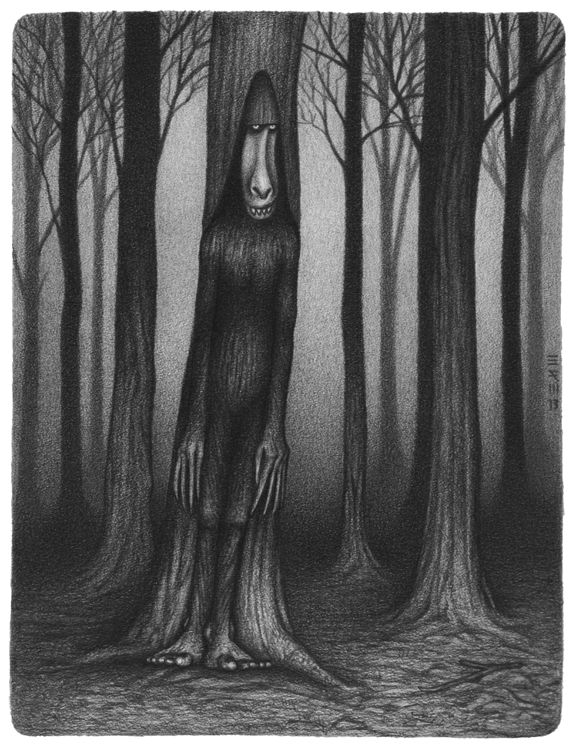 The creature this week is the first from American folklore. It beats the barbegazi as the most literally named creature, because it's called the hidebehind. It hides behind stuff.
The creature this week is the first from American folklore. It beats the barbegazi as the most literally named creature, because it's called the hidebehind. It hides behind stuff.
Trees, mostly, as it is a fearsome critter that stalks lumberjacks and other unwary travelers in the forest, snatching them unaware, and dragging them back to its lair to devour them. It was thought to be the explanation for lumberjacks who never returned to camp.
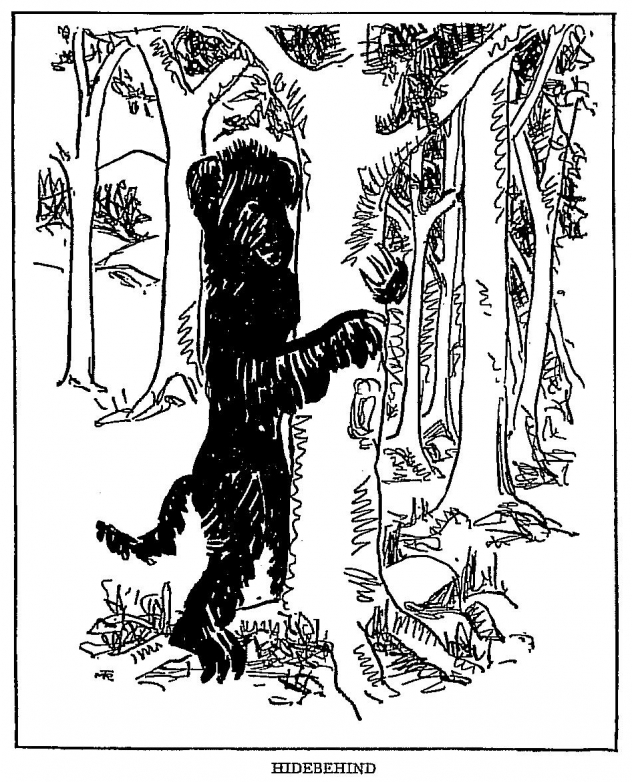 Depictions range from an adorable Irish wolfhound hugging a tree, to a horrifying shadowy, slender man-esque creature contorting itself behind a tree in wait for its next victim.
Depictions range from an adorable Irish wolfhound hugging a tree, to a horrifying shadowy, slender man-esque creature contorting itself behind a tree in wait for its next victim.
Lumberjacks are big guys, though, and usually know the forests well 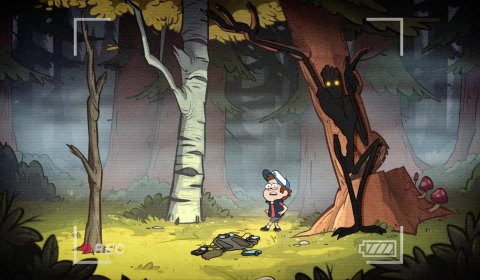 and carry axes, so how could a creature sneak up and catch them? Well, it's said to be so fast that it can immediately slink behind any nearby tree. Well, ok, but what if only skinny trees were available? Well, the hapless lumberjack is not out of the woods yet, both literally and figuratively, because the creature can, and I quote, suck in its stomach so that it can become so slender that it can fit behind any tree.
and carry axes, so how could a creature sneak up and catch them? Well, it's said to be so fast that it can immediately slink behind any nearby tree. Well, ok, but what if only skinny trees were available? Well, the hapless lumberjack is not out of the woods yet, both literally and figuratively, because the creature can, and I quote, suck in its stomach so that it can become so slender that it can fit behind any tree.
There is one way to avoid the creature. It subsists on the contents of the intestines and has an aversion to alcohol. So, logic holds, if you are going to go for a walk in the woods, it's better to be completely stinking drunk. Because it's better to be wandering around the forest drunk with an ax, than risk running into this creature. You know, for safety.
That's it for this week! The theme song is by the band Broke for Free and the creature of the week music is by the unassailable Steve Combs. Thanks so much for listening. See you next time.

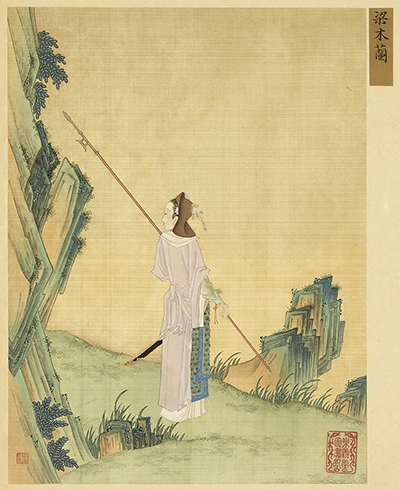
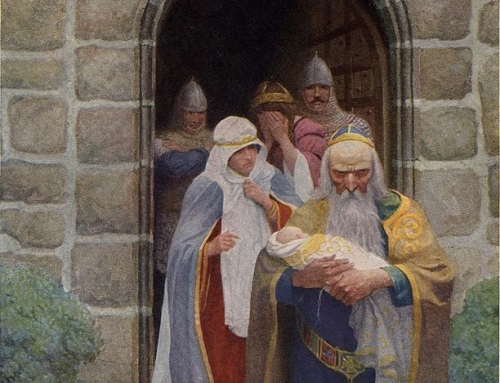
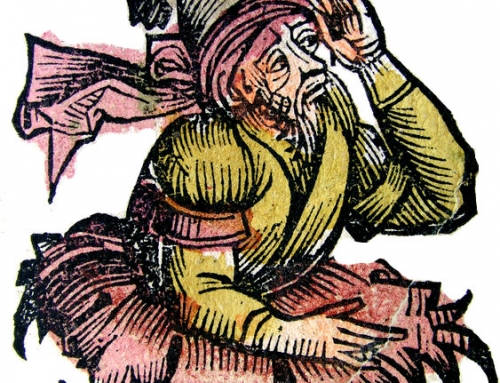

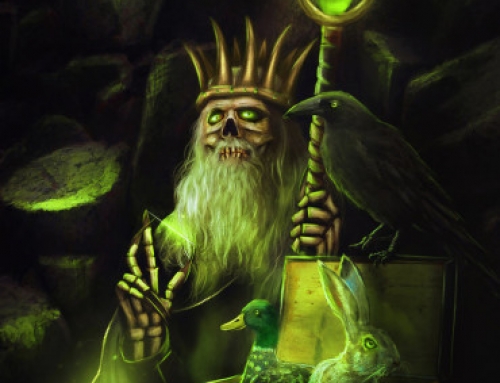
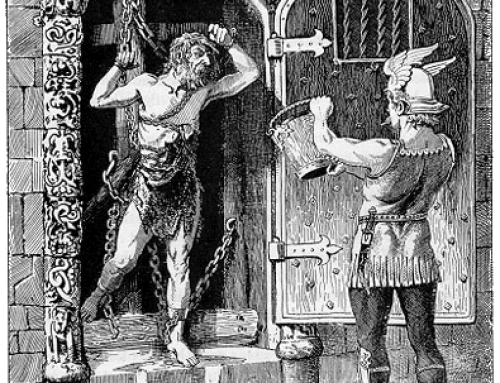
Does anybody know the name of the song that starts as the story ends? It goes something like “While it is true that my time devours the sun, …”
It will take a little while, but I’d be happy to look it up. These episodes are saved on a separate hard drive and packed away at the moment. I can’t remember off the top of my head…
Hi Jason! I’m a fairly recent, but big, fan of your show – keep up the good feminist commentary!) I was wondering if you could point me in the direction of a copy of Xu Wei’s play re: Mulan? English preferred, since I don’t read any other languages :( Thanks for all you do!
Yep! Here’s a free, likely copyright-infringing online version: http://legendofmulan.blogspot.com/2007/05/mulan-play.html It’s been up for nine years, though, so it will probably stay up.
Glad you like the podcast! Thanks for saying hi :)
The translation is iffy at times, but it’s the only version I could find online.